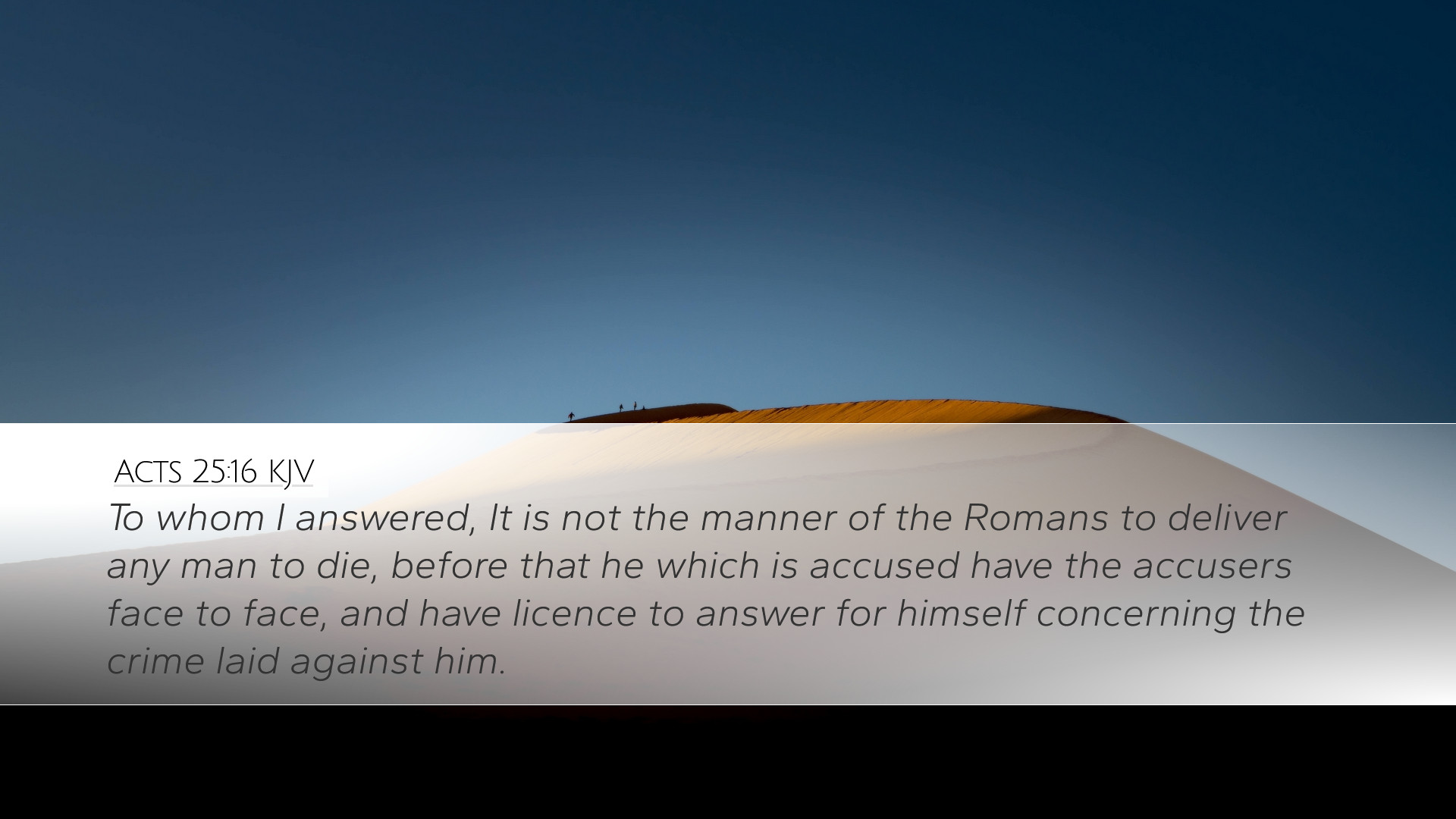Old Testament
Genesis Exodus Leviticus Numbers Deuteronomy Joshua Judges Ruth 1 Samuel 2 Samuel 1 Kings 2 Kings 1 Chronicles 2 Chronicles Ezra Nehemiah Esther Job Psalms Proverbs Ecclesiastes Song of Solomon Isaiah Jeremiah Lamentations Ezekiel Daniel Hosea Joel Amos Obadiah Jonah Micah Nahum Habakkuk Zephaniah Haggai Zechariah MalachiActs 25:16
Acts 25:16 KJV
To whom I answered, It is not the manner of the Romans to deliver any man to die, before that he which is accused have the accusers face to face, and have licence to answer for himself concerning the crime laid against him.
Acts 25:16 Bible Commentary
Commentary on Acts 25:16
Verse: "To whom I answered, It is not the manner of the Romans to deliver any man to die, before that he which is accused have the accusers face to face, and have license to answer for himself concerning the crime laid against him."
Introduction
This passage occurs during Paul's trial before Festus, the Roman procurator, highlighting critical aspects of Roman law and the judicial system. Here, Paul asserts his rights as a Roman citizen, emphasizing the importance of due process. The verse underscores the providence of God in Paul's journey and the unfolding of His divine plan despite adversities.
Contextual Background
Paul had been in custody for two years since his arrest in Jerusalem. His appeals to various authorities were consistent and rooted in a desire for justice. This verse reveals his steadfastness and wisdom as he navigates the Roman judicial system. The mention of "Roman manner" gives insight into the legal frameworks that governed Roman citizens, emphasizing the protection the law offered.
Theological Insights
Theologically, this passage speaks volumes not only about the historical context of the early church but also about God’s sovereignty in the life of Paul. It exemplifies how God used even the political system of Rome to fulfill His purposes. Here are some insights from notable commentators:
-
Matthew Henry:
Henry emphasizes Paul’s commitment to justice, arguing that he showcases the integrity of the Roman legal system. Paul's assertion illustrates an essential principle that justice must be served fairly, granting every individual the opportunity to defend themselves with their accusers present. This principle resonates with the biblical calling for fairness and righteousness in dealings.
-
Albert Barnes:
Barnes points out that Paul's reference to Roman custom reflects the wisdom in engaging in legal frameworks. His statement illustrates both a defense strategy and highlights the inherent rights of individuals, drawing a parallel to modern concepts of justice and safeguarding against wrongful accusations.
-
Adam Clarke:
Clarke delves deeper into the judicial process, noting that the Roman governance system was more humane than other systems of the era, offering a structured approach to accusations and defenses. He expounds on how the rights assured under Roman law were critical to Paul’s eventual appeal to Caesar, thereby enriching our understanding of God's hand in mundane affairs to bring about His will.
Legal and Ethical Dimensions
This verse challenges contemporary readers to consider the values of justice, due process, and personal rights. In an era where ethical dilemmas abound, the principles represented here are timeless and essential for pastoral application and ethical discourse. Pastors and theologians can extrapolate significant teachings about the dignity of the accused and the necessity of honest representation. Each human deserves a fair opportunity to present their case, resonating with the ethos of love and justice permeated throughout Scripture.
Application for Preaching and Teaching
For pastors, this verse serves as a pivotal point in teachings about justice. Here are a few applications:
- The Importance of Fairness: Encourage congregants to advocate for fairness in their personal and professional lives, employing the principles demonstrated by Paul.
- Valuing Every Individual: Teach that every person, regardless of their standing, has inherent dignity and deserves to be heard.
- God’s Sovereignty in Trials: Remind the congregation that God's plans often unfold through legal frameworks, historical events, and personal tribulations, as seen in Paul’s journey.
- Engaging with Culture: Encourage believers to engage with their cultural and legal systems proactively, allowing them to be instruments of God's justice.
Conclusion
Acts 25:16 is more than a mere historical remark; it encapsulates profound truths about justice, the character of God, the human condition, and civic responsibility. As we reflect on this verse, we are reminded of our calling to pursue justice, speak truth, and uphold the rights and dignity of all individuals, showcasing the love of Christ through our actions. The insights from Matthew Henry, Albert Barnes, and Adam Clarke provide a rich tapestry of understanding that fuels our ministry and scholarship, encouraging us to remain steadfast in our faith amidst trials.


